Victor Borge
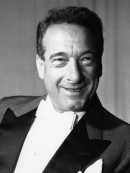
Wednesday, August 9, 1967
Victor Borge was born in Copenhagen, Denmark Januar 3, 1909, the son of Bernhard and Frederikke Rosenbaum. He was named Børge Rosenbaum, and his musical talent was no surprise as his father was a musician in the Royal Danish Chapel. He was educated at the Royal Danish Academy of Music by Olivo Krause, and later by Victor Schiøler, Frederic Lamond and Egon Petri. He had his piano debut in 1926 at "Odd Fellow Palæet" in Copenhagen and was recognized as a very talented musician.
During the 1930s he became one of Denmark's most popular artists. He started his career as a classical pianist, but his talent for making the audience laugh was soon obvious, and he started developing his unique blend of humour and music. He had his revue debut in 1933 and his film debut in 1937.
In 1940 he was forced to leave Denmark, and he travellled from Petsano to New York. Although he didn't speak English he soon managed to "translate" his humour, and he performed for the first time in Bing Crosby's radio show in 1941. In 1942 he was pronounced "the best new radio performer of the year" by the american press, and his radio and TV shows became extremely popular. He became an American citizen in 1948, and had his own show, "Comedy in Music," at The Golden Theatre, New York 1953-56.
He had performed as soloist and conductor with leading orchestras from 1956, and has performed as Opera Conductor, eg. "Magic Flute," Cleveland Orchestra, 1979 and The Royal Danish Theatre, 1992. He established several trusts, and he received numerous honourable awards and honours. He was the patron of The Danish Royal Academy of Music Children's Choir.
Victor Borge died at home in his sleep, December 23rd, 2000.
Ferrante and Teicher
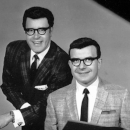
Monday, July 31, 1967
Saturday, August 16,1969
Saturday, August 29, 1970
Arthur Ferrante (September 7, 1921, New York City - September 19, 2009), and Louis Teicher (August 24, 1924, Wilkes-Barre, Pennsylvania - August 3, 2008, Highlands, North Carolina) met while studying at the Juilliard School of Music in New York in 1930. Musical prodigies, they began performing as a piano duo while still in school. After graduating, they joined the Juilliard faculty.
In 1947, they launched a full-time concert career, at first playing nightclubs, then quickly moving up to playing classical music with orchestral backing. Between 1950 and 1980, they were a major American "easy listening" act, and scored four big U.S. hits: "Theme from The Apartment," "Theme from Exodus," "Tonight," and "Midnight Cowboy."
They performed and recorded regularly with pops orchestras popular standards by George Gershwin, Jerome Kern, Cole Porter, Richard Rodgers, the Sherman Brothers and others. In 1973, they did the Hollywood Radio Theater theme for the Rod Serling radio drama series, The Zero Hour.
Earl "Fatha" Hines
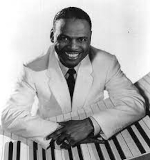
Earl Hines, in full Earl Kenneth Hines, byname Fatha, (born Dec. 28, 1903, Duquesne, Pa., U.S.-died April 22, 1983, Oakland, Calif.), American jazz pianist, bandleader, and composer whose unique playing style made him one of the most influential musicians in jazz history.
As a child he learned trumpet from his father and then piano from his mother. After playing in trios during his high school years, Hines played in various bands throughout the Midwest. Hines became Louis Armstrong's pianist and musical director. He participated in several groundbreaking recording sessions at about this time, including several as a member of Armstrong's seminal quintet, the Hot Five, and others with clarinetist Jimmie Noone.
The Armstrong-Hines recordings (1927-29), which include the important "West End Blues," "Muggles," "Skip the Gutter," and their "Weather Bird" duet, are jazz classics. On these sides, Hines demonstrates a virtuosic piano technique that was far more advanced than that of his contemporaries.
In the late 1920s Hines formed his own big band, noted for ensemble unity and hard-driving rhythm. From 1928 through the 1930s, this was the house band at Chicago's Grand Terrace Ballroom. In the early 1940s Hines formed a new West Coast band that included such bop pioneers as Charlie Parker and Dizzy Gillespie, as well as singers Sarah Vaughan and Billy Eckstine.
Hines resumed his partnership with Louis Armstrong in 1948 and played in Armstrong's small group, the All Stars, until 1951. He next formed a sextet that became a fixture at San Francisco's Hangover Club during the mid-1950s. Hines had a major career resurgence during the early 1960s, with concert performances and recordings leading to renewed critical and popular appreciation. During his years as an elder statesman of jazz, Hines's dazzling technique remained as strong as ever, and his performance at the 1974 Montreux Jazz Festival revealed his continued openness to new ideas.
Byron Janis
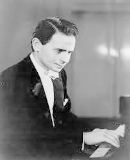
Byron Janis (born March 24, 1928) is an American classical pianist. He made several recordings for RCA Victor and Mercury Records, and occupies two volumes of the Philips series Great Pianists of the 20th Century. His discography covers repertoire from Bach to David W. Guion and includes major piano concertos from Mozart to Rachmaninoff and Liszt to Prokofiev.
Janis studied with Abraham Litow until he was 8 years old. Vladimir Horowitz heard Janis play Rachmaninoff's Concerto No. 2 in Pittsburgh, and immediately took him as his first pupil. Janis studied with Horowitz from 1944 until 1948.
Janis was also a composer. He wrote music for musical theater, including the score for a 1993 Off-Broadway adaptation of "The Hunchback of Notre-Dame," for television shows, and in collaboration on several pieces with Cy Coleman.
In 1967, Janis accidentally unearthed what The New York Times called "That rarest of all musical items...", two previously unknown manuscripts of published Chopin waltzes (Op. 18 and Op. 70, No. 1) at the Chateau de Thoiry in France. Several years later, Janis found the same two waltzes in different versions at Yale University.
In 1973, Janis developed severe arthritis in both hands and wrists. In 1985, he talked about his difficulties in public for the first time and became the First Ambassador for the Arthritis Foundation. In June 2012, he was presented with a Lifetime Achievement Award for his work in Arthritis Advocacy.
Liberace
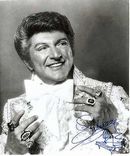
August 9 thru August 14, 1966
Liberace was born Wladziu Valentino Liberace on May 16, 1919, in West Allis, Wisconsin. He appeared as a soloist with the Chicago Symphony Orchestra at age 16. He later began giving concerts in flamboyant costumes with ornate pianos and candelabra, playing primarily popular music. Very successful, he hosted his own TV variety series, The Liberace Show (1952-1955, 1969), and appeared in films such as Sincerely Yours (1955). With his unique blend of classical training and over-the-top showmanship, Liberace was one of the most famous performers of the 20th century. In later years he performed frequently in Las Vegas.
He had long been derided for his effeminate ways, and he ended up suing a British publication for libel after the magazine implied that he was gay. While he was later revealed to be gay, Liberace worked hard to conceal this fact to maintain his dominantly female following. While some critics have dismissed him for being overly sentimental, Liberace has left a lasting impact on the world of entertainment. His elaborate and sometimes garish style has influenced the likes of Presley, Elton John and David Bowie to name a few.
Liberace passed away on February 4, 1987, at his home in Palm Springs, California. Initially, his doctor reported that the showman died of cardiac arrest. Later, an autopsy by the Riverside County coroner concluded that Liberace had actually died of AIDS-related pneumonia.
Les McCann
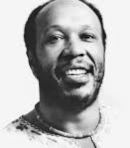
Winning a Navy singing contest led to an appearance on The Ed Sullivan Show. McCann's main career began in the early 1960s when he recorded as a pianist with his trio for Pacific Jazz. In 1969, Atlantic released Swiss Movement, album recorded with saxophonist Eddie Harris and trumpeter Benny Bailey at that year's Montreux Jazz Festival. The album contained the song "Compared to What", and both the album and the single reached the Billboard pop charts. "Compared to What" criticized the Vietnam War. The song was written by Eugene McDaniels years earlier and recorded and released as a ballad by McCann in 1966 on his album Les McCann Plays the Hits. Roberta Flack's version appeared as the opening track on her debut album First Take (1969).
After the success of Swiss Movement, McCann, primarily a piano player, emphasized his vocals. He became an innovator in soul jazz, merging jazz with funk, soul, and world rhythms. He was among the first jazz musicians to include electric piano, clavinet, and synthesizer in his music.
In 1971, he and Harris were part of a group of soul, R&B, and rock performers, including Wilson Pickett, the Staple Singers, Santana and Ike & Tina Turner, who flew to Accra, Ghana to perform a 14-hour concert for over 100,000 Ghanaians. The March 6 concert was recorded for the documentary film Soul to Soul. In 2004 the movie was released on DVD with an accompanying soundtrack album.
Source: wikipedia.org/
Photo Source: nfo.net/usa/guylomb.jpg
Peter Nero
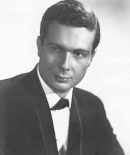
Monday, June 26, 1967
Monday, August 11, 1969
Born in Brooklyn, Mr. Nero began his formal music training at the age of seven. By the time he was 14, he was accepted to New York City's prestigious High School of Music and Art and also won a scholarship to the Juilliard School of Music. Constance Keene, his teacher and mentor, once wrote in an issue of Keyboard Classics that "Vladimir Horowitz was Peter's greatest fan"
Mr. Nero's first major national TV success came at age 17 when he was chosen to perform Rhapsody in Blue on Paul Whiteman's TV special. He subsequently appeared on many top variety and talk shows, including 11 guest appearances on The Ed Sullivan Show and numerous appearances on The Tonight Show Starring Johnny Carson.
Hailed as one of the premier interpreters of Gershwin, Mr. Nero starred in the Emmy Award- winning NBC Special "S'Wonderful, S'Marvelous, S'Gershwin." Other TV credits include performances on PBS-TV's "Piano Pizzazz" and with the National Symphony in Washington, D.C., on its July 4th special, "A Capitol Fourth." He served as music director and pianist for the PBS-TV special "The Songs of Johnny Mercer: Too Marvelous for Words" with the Philly Pops.
During the years of the prime time Variety shows he performed 12 times on the Ed Sullivan Show, Perry Como, Jonathon Edwards, Dinah Shore, Jackie Gleason, and George Gobel, to name a few.
Among Mr. Nero's long list of honors are six honorary doctorates (the most recent from Drexel University in 2004) and the prestigious International Society of Performing Arts Presenters Award for "Excellence in the Arts." He is also included on two historic walks of fame—one in Philadelphia, and one in Miami, Florida. In 1999 he received the Pennsylvania Distinguished Arts Award, presented by Pennsylvania Governor Tom Ridge.
George Shearing
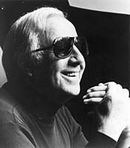
Sunday, September 2, 1962
Monday, August 19, 1963
Monday, August 12, 1968
George Shearing enjoyed an international reputation as a pianist, arranger, and composer. Equally at home on the concert stage as in jazz clubs, Shearing is recognized for inventive, orchestrated jazz. He wrote over 300 compositions, including the classic "Lullaby of Birdland," which has become a jazz standard. Born in 1919 in the Battersea area of London, in 1947, he moved to America, where he spent two years establishing his fame on this side of the Atlantic. The Shearing Sound commanded national attention when, in 1949, he gathered a quintet to record "September in the Rain" for MGM. The record was an overnight success and sold 900,000 copies. His U.S. reputation was permanently established when he was booked into Birdland, the legendary jazz spot in New York. He became of one of the country's most popular performing and recording artists.
Source: georgeshearing.net/
Photo Source: www.allaboutjazz.com/